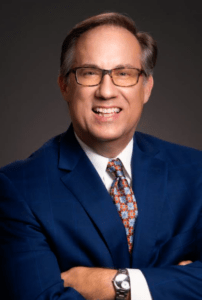Last December my wife, Lori, and I officially joined Oakland Baptist Church in Rock Hill, S.C., after attending worship for several months. I particularly was grateful for the music and worship leadership of a new colleague (and now friend), Suzanne Ringer. In February, Suzanne announced she was accepting the call of another ministry position and I was asked to become the interim minister of music.
I’ve just been in this new role at this new place for two weeks and no doubt, there are things yet to be learned. But I’m already remembering some things I had almost forgotten about the music ministry and transitions.

Doug Haney
It is such a privilege for people to look to you for direction in congregational worship and music ministry. There is something remarkable about standing up in front of a group of worshipers on a Sunday morning. You cue them. They sing. Some with robust enthusiasm. Others sing timidly. Others not at all.
I wish I had paid more attention to congregational singing earlier in my ministry. I want to be sure to nurture congregational singing in my time at Oakland.
Be open with the choir you stand in front of (in appropriate ways) but remember, they came to sing, not to hear you talk. Years ago in Charlotte, there was a choir president named Bob and we would meet for lunch occasionally. Once at lunch he said to me, “I really like the story you told the other night about your grandmother. That was really moving. I think you should do that more often.”
What I heard him say is the choir wanted to know me. Not just the musician-minister me. But the person. The person who had a grandmother.
“Recognize the legacy of those leaders who came before you.”
Again, this sort of thing can be overdone. Or one can talk only about the “blessings” of life, and never the struggles — which leads to a sort of false Facebook framing of one’s story. Tell your story (from time to time) and find ways to hear the stories of your singers.
Recognize the legacy of those leaders who came before you. At Oakland now, I am following the excellent music ministries of Suzanne Ringer, Pam Greenwood and Sheldon Timmerman. These are ministries that stretch back 30 years.
Will I do things differently, even in this interim? Of course, because I am a different person with my own gifts. But even as I captain the ship of music ministry, I need to remember: Someone else was the leader before me and they were appreciated and loved by those who followed them.
I find that often lay people have a much greater capacity for being good followers than we give them credit for. Are there those who are insensitive, who compare you to some other leader at some other time? Yes. And that is difficult. But many are mature enough to follow new leaders.
How do we help our lay people with these transitions in healthy ways? (Here I’m thinking more about permanent positions than an interim). Setting aside the situation of a truly toxic predecessor, let me suggest two things:
Acknowledge the work of your predecessor from time to time and recognize the legacy of the music ministry you have inherited. My former pastor, George Mason, invoked the name of Bruce McIver, his predecessor, from the Wilshire pulpit occasionally. Now, George and Bruce had a unique friendship (and this sort of thing is not always the case). But this model of acknowledging the past can actually facilitate fresh beginnings for a new leader.
Be patient. My dear friend and mentor, Bob Hatfield, once told me, “Do not change anything for a year.” (This is an axiom that would serve all church staff well). Some may say, “I don’t have the luxury of taking that much time.” It depends on the context.
When an interim or a permanent music leader steps into a new situation without listening and observing and reading the landscape, you do not have enough information to make good decisions. Take the long view.
What if the senior pastor is pushing for change? If you decide you agree and are willing to lead through change, communicate with your boss what you are doing to plan for those improvements while taking the time to develop a network of trust and support.
I served as minister of music at Wilshire Baptist Church in Dallas 19 years. Bill James was minister of music at Wilshire for 33 years. We are all interims eventually. We all pass the baton eventually.
“To everything there is a season.” Let us lead when it is our time to lead and at the same time let us recognize that we often are the recipients of wonderful legacies we inherit.
Doug Haney lives in Rock Hill, S.C., and leads a national network of church musicians called Polyphony. He served churches in Texas, North Carolina and Georgia as minister of music.


